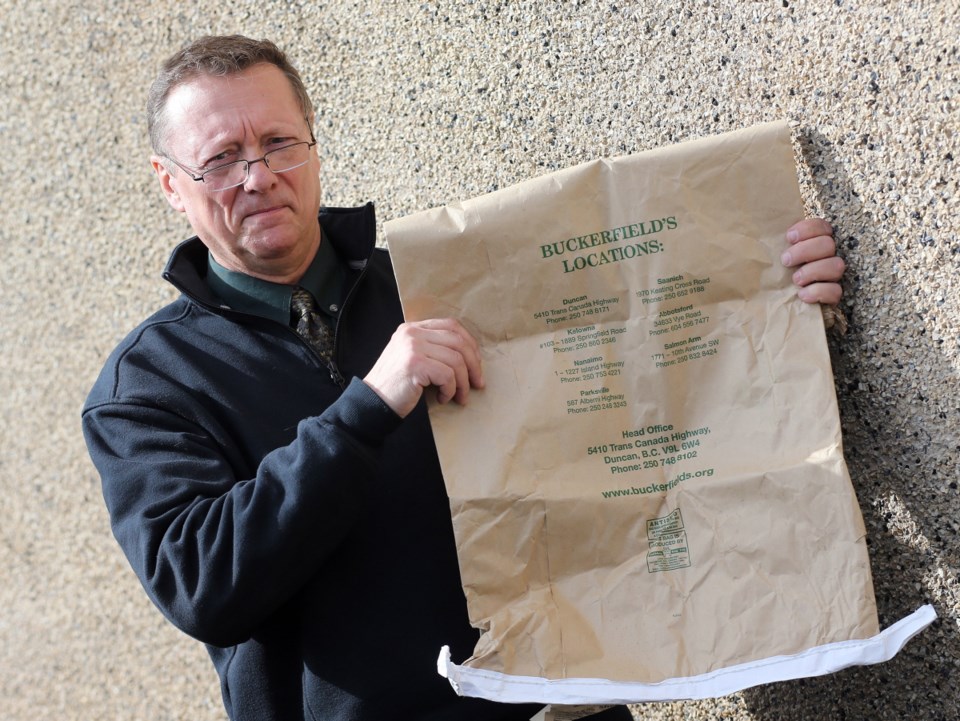The CEO of a chain of farm supply stores says his company won’t pay fees toward the province’s new recycling program until the stewardship organization leading it shows more transparency.
Buckerfield’s co-owner Kelvin McCulloch said that Multi-Material B.C., which formed in 2011 to run the program, is breaking its contract with members by not providing independently audited financial statements online.
“There’s no accountability,” said McCulloch, who performed audits in his previous positions as a chartered accountant and consulting director for KPMG in Victoria. “They’ve already spent money for 21/2 years, so let’s see those costs in their financial statements.”
The new program follows a 2011 amendment to the province’s recycling regulation, intended to shift financial responsibility for recycling packaging and printed paper from local governments to the industries that produce them.
The province approved MMBC, a new non-profit agency representing those producers, to manage the program beginning May 19.
McCulloch is also concerned that the fees Buckerfield’s is required to pay as a producer of recyclable packaging — like feed bags — are arbitrary and don’t reflect the real cost of recycling. It was a mistake to shift recycling oversight from governments to a non-profit, industry-run agency, he said.
“Some of the fundamental features of a government program of equity, transparency, efficiency, effectiveness and accountability — none of those are present here,” he said.
Businesses that don’t wish to join MMBC must find an alternative way to fulfil their responsibilities under the regulation. But according to McCulloch, that’s not a real option, as MMBC is the only stewardship agency that the Ministry of Environment has approved for packaging and printed paper since changing the regulation.
Organizations that join MMBC will pay fees to cover the costs of collecting and processing materials. McCulloch estimates that Buckerfield's, which primarily supplies materials to backyard and hobby farmers, would have to pay about $60,000 annually.
MMBC managing director Allen Langdon said the organization hasn’t posted financial statements yet because operations don’t begin until May. “We haven’t had a full year of operations, so we don’t have any audited financial statements,” he said. “But it’s common practice to publish audited annual financial statements, and we’ve made a commitment to do that.”
The agency has published its estimated startup costs at $7.5 million and an additional $16 million in working capital needed before the program launch in May, which will cover collection, transportation and processing costs for the first 21Ú2 months. Those amounts have not been independently audited.
Member fees are calculated based on the volume of packaging and printed paper produced, he said.
“We ask companies how much packaging they supply into the marketplace. We take that combined with the estimated costs of the program, which is fairly well known given that we’ve got specific collection contracts and a processing contract,” Langdon said.
If Buckerfield’s is unhappy with the arrangement, it doesn’t have to join, he said. “All the people who join MMBC are doing it because they want to appoint MMBC to discharge their obligations, but he doesn’t have to join.”
On Monday, a coalition of business groups announced plans to fight the changes through a campaign called Rethink it, B.C.
The changes will mean hidden costs for consumers, put a world-class blue-box program in the hands of industry players with an interest in profit, as well as threaten local businesses, said Peter Kvarnstrom, chairman of the Canadian Association of Newspapers and president of B.C. operations for Glacier Media, which owns a part interest in the Times Colonist.
“No other jurisdiction has handed the entire system over to industry for both the funding and running of that system. We worry about these major stewards and whether or not their motivations are consistent with operating a world-class recycling system or whether it’s simply a profit-motivated decision-making organization,” Kvarnstrom said.
“What we’re really looking for is the government of B.C. to pause the program, involve itself in the discussion, talk to B.C. businesses about the challenges they see in the program and help build a great program that really reflects the needs of British Columbians.”
The Ministry of Environment refused to comment.



